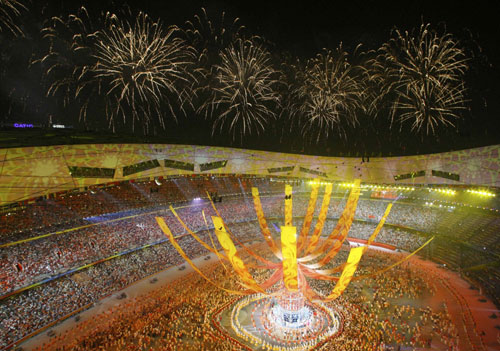The closing ceremony of the Beijing Olympic Games on Sunday night was a celebration more in tune with the usual television galas familiar to every Chinese viewer.
It was a moment of festivity where many singers and celebrities joined hands to deliver songs of farewell as well as to present fond memories of the past 16 days.
 Fireworks explode during the closing ceremony of the Beijing 2008 Olympic Games at the National Stadium August 24, 2008. [Agencies]
Fireworks explode during the closing ceremony of the Beijing 2008 Olympic Games at the National Stadium August 24, 2008. [Agencies] |
A tower that may imply the Tower of Babel rose in the middle of the Bird’s Nest, signifying human efforts to reach out and communicate with one another. Only this time, it was a huge success.
London, the city that will host the 2012 Summer Games, put on an eight-minute show-within-a-show featuring football icon David Beckham and Led Zeppelin guitarist Jimmy Page. But the star of the London segment was a double-decker bus, which served as an anchor for a group of dancers who channeled the energy and vibrancy of a world-class metropolis. Besides, the bus was like a transformer, which magically turned everyday life into one of remembrance.
If the ping-pong games between the Chinese and Americans in early 1970s played as an overture for the two countries’ thawing relations, the 29th Olympiad has no doubt been a grand entrance for China to thrust its presence on the global stage.
The set phrase is “100-year dream of Olympics”, but the early years were punctuated with constant frustrations, such as Liu Changchun’s lone participation in the 1932 Los Angeles Games. Not until 1984 did China win its first gold medal. If anything, the Beijing Games showcased the past three decades of the nation’s economic recovery. The ultra-modern venues and the transport facilities would not have been imaginable 30 years ago. They are as much symbols of economic prowess as architectural masterpieces.
Then there was the human touch. The “seamless organization”and the smiles of volunteers, have received praise from all over the world. The incredible logistics behind the smooth operation was the result of careful planning and meticulous coordination.
Finally, the games belonged to athletes, and every audience member may have his or her favorite or a most touching moment. The discipline of Michael Phelps, the exuberance of Usain Bolt, and the agony of Liu Xiang, who quit after an Achilles heel injury, come to mind. Phelps was like a big fish that brought the waters of the Water Cube alive, snatching eight gold medals as if they were smaller fish floating waywardly; Jamaica’s Bolt not only bolted through three world records, but with such irrepressible thrill that put recreation in recreational sport.
IOC President Jacques Rogge revealed that his most touching moment was not one of those record shattering sprints or splashes, but an embrace between two athletes: bronze medallist Nino Salukvadze of Georgia and runner-up Natalia Paderina of Russia after the 10-meter air pistol event. Their countries were embroiled in a military conflict, yet the two athletes transcended it with good-natured decency and goodwill.
China, with 100 medals in total count, including 51 gold, has yielded the richest crop of heroes in its history. As one of the songs at the closing ceremony implored guests “to stay” in a gesture of Chinese hospitality, China is here and to stay as a sporting power, and its implications will reverberate beyond sports.